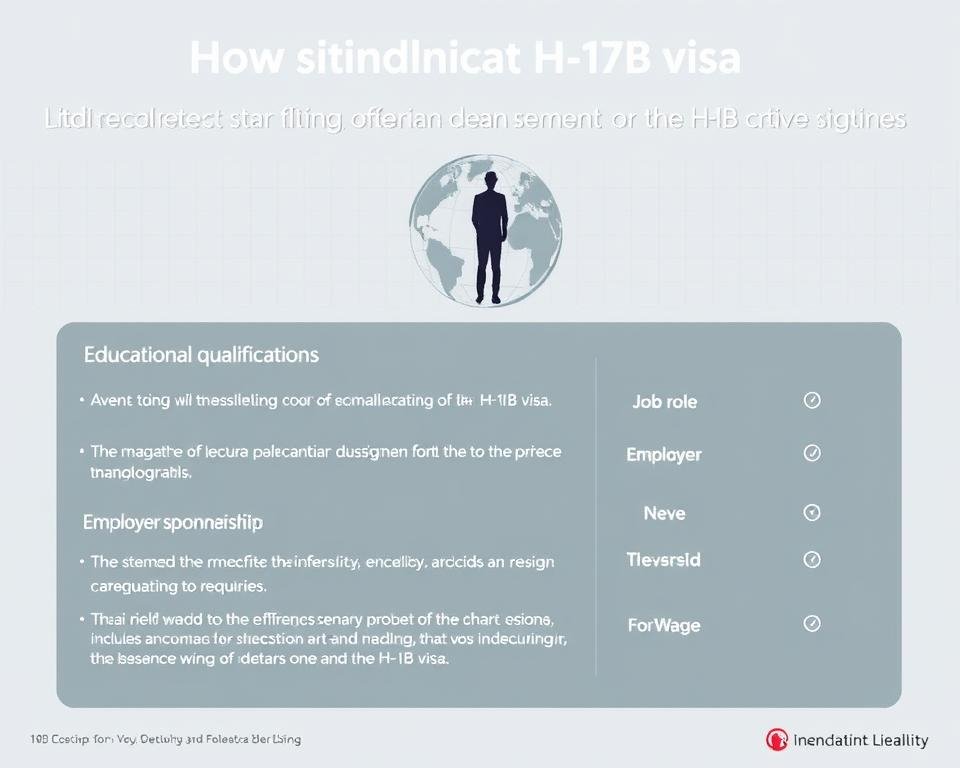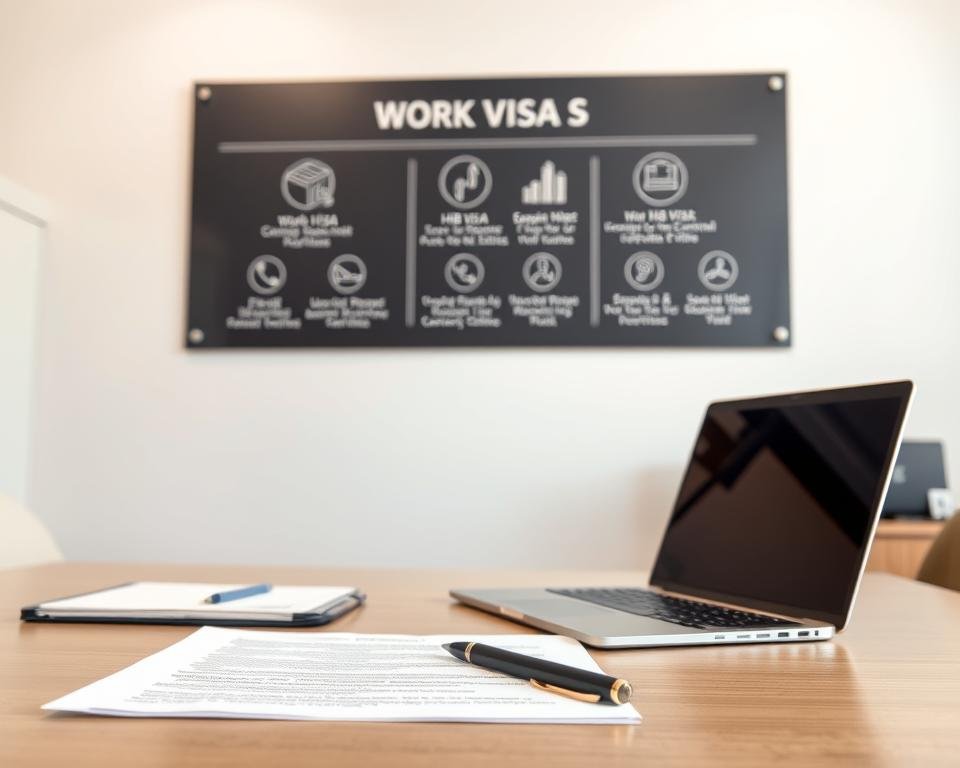Work Visa in USA After Graduation: H-1B Options

"Opportunities don't happen, you create them." – Chris Grosser. This saying is very true when it comes to getting a work visa in the USA after you graduate. For students from other countries, the H-1B options are a way to turn their studies into real jobs in the United States. The H-1B visa is more than just a legal document. It's the key that lets graduates start their careers in the USA.
- Understanding the H-1B Visa
- Eligibility Criteria for H-1B Visa
- Work Visa in USA After Graduation (H-1B options)
- Application Process for H-1B Visa
- Visa Sponsorship for Recent Graduates
- Employment Opportunities for Foreign Graduates
- Post-Graduation Work Opportunities in the US
- Challenges in Securing H-1B Visa
- Changing Work Visa Regulations in the United States
- Future of H-1B Visa Options
- Expert Tips for Effective H-1B Applications
Understanding the H-1B Visa
The H-1B visa is a key way for international workers to find jobs in the United States. It lets U.S. companies hire foreign workers in special jobs that need advanced skills. These jobs are in fields like tech, engineering, and medicine.
To get an H-1B visa, you need a U.S. employer to sponsor you. You can't apply for this visa by yourself. The employer must say the job needs your skills, helping the U.S. labor market.
International students often see the H-1B visa as a way to work in the U.S. after they graduate. It lets them use their education and skills in a competitive job market. It's a chance for professional growth and cultural experience. Knowing how the H-1B visa works can help students make a smooth transition from school to work.

Eligibility Criteria for H-1B Visa
The H-1B visa program is a great chance for foreign professionals to work in the United States. It's important to know the rules to apply successfully. There are several key things you need to meet to qualify.
Educational Requirements
One main eligibility criteria for H-1B visa is education. You need at least a bachelor's degree or its equivalent in a relevant field. This shows you have the right education for your job.
The education needed for H-1B varies by job. Jobs in tech, healthcare, engineering, and finance usually need advanced degrees. This is because these fields require specific skills and knowledge.
Types of Jobs Eligible for H-1B Visa
The H-1B visa is for professionals in specialty occupations. Some types of jobs for H-1B include:
- Information Technology Specialists
- Healthcare Professionals such as Doctors and Nurses
- Engineers in various disciplines
- Financial Analysts
- Marketing Managers
Each job must match the applicant's education. This is key for a successful application.

Work Visa in USA After Graduation (H-1B options)
Recent graduates in the U.S. need to know about work visa options. The H-1B visa is a top choice for international students. It lets skilled workers live and work in the U.S. for a sponsoring employer.
Switching from an F-1 student visa to an H-1B visa needs careful planning. Graduates must find an employer to sponsor their visa. It's important to have a job offer ready by the time studies end.
The H-1B program lets graduates work in jobs related to their field of study. It's a chance for professional growth and a path to permanent residency in the U.S.

Understanding the post-graduation work permit process can help graduates find jobs for the H-1B visa. This approach can improve their chances in the competitive job market.
| Visa Type | Eligibility Criteria | Duration | Employer Sponsorship |
|---|---|---|---|
| H-1B | Bachelor's degree or higher in a relevant field | Up to 3 years, renewable | Required |
| OPT | F-1 visa status with valid employment | Up to 12 months (with 24-month extension for STEM) | Not required |
Application Process for H-1B Visa
Getting a H-1B visa is a big step for those wanting to work in the U.S. It involves several steps that need careful planning and quick action. It's important to know the key parts to make your application successful.
Steps for Applying
The visa application process has a few main steps:
- Labor Condition Application (LCA): First, the employer must file an LCA with the Department of Labor. This shows the job meets certain rules.
- Petition Submission: After getting LCA approval, the employer sends the H-1B petition to USCIS. They provide all needed documents to support the application.
- Processing: USCIS then checks the application. Regular processing takes a few months. But, premium processing can speed up the approval time.
- Decision Notification: After checking, USCIS tells the applicant about their decision. If it's approved, the applicant can move on to get the visa.
Timeline for H-1B Visa Approval
Knowing when you'll get your H-1B visa is key. Here's a look at the main times in the application:
| Stage | Estimated Duration |
|---|---|
| Labor Condition Application Review | 7 days |
| Petition Processing (Regular) | 3 to 6 months |
| Petition Processing (Premium) | 15 calendar days |
| Overall Application Process | Varies significantly by circumstances |
Knowing these times helps with planning. Keeping up with each step makes the application process smoother for those applying for a H-1B visa.
Visa Sponsorship for Recent Graduates
Visa sponsorship is key for international students wanting to work in the U.S. after graduation. Getting a job that offers an H-1B visa is a big step. Employers see the value in fresh talent and the new ideas recent graduates bring.
What affects an employer's decision to sponsor a visa includes the job's skills needed, the industry's demand, and the company's experience with international workers. Students can boost their chances by doing internships during their studies. This experience helps build skills and makes connections in their field.
Networking is also important for recent graduates. Making connections, going to career fairs, and using online platforms can lead to job opportunities. In the job market, every connection can be a chance for a valuable job.
Employment Opportunities for Foreign Graduates
Foreign graduates bring unique skills and views that many U.S. companies want. The job market for international graduates is wide, with many industries looking for talented people. Knowing which sectors hire foreign workers can help graduates find their way in the job search.
Industries Actively Hiring International Students
Some sectors always need international talent. These fields offer great job chances and often help with work visas. Here are some key areas:
- Technology: The tech world often hires international graduates for jobs in software, data, and security. Big names like Google, Microsoft, and Amazon sponsor H-1B visas.
- Healthcare: Hospitals and health groups look for foreign nurses and medical researchers because of staff needs. Places like Cleveland Clinic and Johns Hopkins help with visa support.
- Finance: Global finance companies want graduates in finance, economics, and numbers. JPMorgan Chase and Goldman Sachs are known for hiring abroad.
- Engineering: The engineering field, covering civil, mechanical, and electrical, also offers many job chances. Boeing and General Electric often sponsor H-1B visas for engineers.
These sectors show the job chances for foreign workers in the U.S. By focusing on industries that hire abroad, international graduates can find good jobs and deal with visa issues.
Post-Graduation Work Opportunities in the US
Recent graduates looking to start their careers in the United States have many options. These choices go beyond the usual H-1B visa. Exploring these alternatives can lead to rewarding jobs and help navigate the complex immigration system.
Alternatives to the H-1B Visa
The Optional Practical Training (OPT) program is a great choice for gaining work experience. It lets international students work in their field for up to 12 months. STEM graduates can even get an extra extension. This makes OPT a key part of finding work after graduation in the US.
For those with exceptional skills, the O-1 visa is a top option. It's for professionals in science, arts, education, business, or sports. This visa attracts top talent to various fields.
There are also other visas for work, like the L-1 visa. It lets companies move employees from abroad to the US. Knowing about these visas helps graduates plan their entry into the US job market.
Challenges in Securing H-1B Visa
Getting an H-1B visa is tough for many recent graduates. There's a lot of competition for a few spots, and the rules are strict. Knowing these challenges can help you find a job and get through the visa process better.
Common Reasons for Visa Denial
Many things can lead to visa denials. Learning about common reasons can help you prepare. Here are some common issues:
- Insufficient Documentation: Not having all the needed documents can get you disqualified right away.
- Inability to Demonstrate Specialty Occupation: Your job must match certain qualifications to be considered a specialty occupation. Without proof, you might get denied.
- Failure to Meet Minimum Wage Requirements: Your salary must meet the minimum wage for your job.
- Inconsistencies in Application: If your application has wrong or conflicting information, it can raise concerns.
- Overly Ambitious Job Descriptions: Job descriptions that are too big can make people question if the job is real.
Changing Work Visa Regulations in the United States
The rules for work visas in the United States keep changing, mainly for the H-1B visa. New rules have made it easier to apply but also changed how you qualify. These changes are big for international students and graduates wanting to work in the U.S.
One key change is that employers must be very clear about what skills a job needs. They have to make sure the person applying has the right skills for the job. This makes the application process more strict.
The time to apply has also changed. You need to know the new deadlines because they can affect when you can apply. It's important to keep up with these changes to apply successfully.
With these rules changing, it's important to stay updated. This helps graduates plan their careers better. The new rules affect how people apply for visas and how employers hire international talent. This changes the job market.
| Regulation Change | Description | Impact |
|---|---|---|
| Increased scrutiny on qualifications | Employers must provide detailed justifications for the required qualifications. | Higher chance of approvals for qualified applicants. |
| Revised application timeline | Changes in submission dates and required documentation. | Applicants need to be more timely and organized. |
| Job market alignment | Enhanced focus on ensuring jobs truly require specialized skills. | Potential reduction in available H-1B positions for generic roles. |
Future of H-1B Visa Options
The U.S. immigration landscape is always changing. Several factors will shape the future of H-1B visas. These include new laws, the need for workers, and how people view immigration. Businesses across different sectors are pushing for changes to make the application process easier and to allow more people to apply.
Trends and Predictions for Upcoming Years
There's a growing understanding of the importance of international talent in the U.S. economy. With talent shortages in tech, healthcare, and engineering, the need for H-1B visas is expected to rise. Companies want to increase the number of new visas to meet these needs, which could lead to changes in H-1B options.
Immigration reform talks are ongoing, and policies might become more welcoming to skilled workers. Many graduates from U.S. schools have high qualifications, making them competitive in the job market. For more information on H-1B specialty occupations, check out this resource.
As society debates immigration, public views might become more open, affecting H-1B visas. The government and businesses working together could lead to new solutions. These changes could address both the need for workers and the economy's health. Staying informed about these trends can help those interested in H-1B visas understand what's coming.
Expert Tips for Effective H-1B Applications
International graduates aiming for an H-1B visa need to know the best strategies. Start by making your resume stand out. It should show your skills, experiences, and achievements that match the job you want. A good resume can make you more attractive to employers.
Getting strong recommendation letters is also key. Letters from advisors, past employers, or internship supervisors can boost your application. Make sure these letters are personal and highlight your strengths.
Timing is critical in this competitive field. Knowing the application deadlines helps you plan better. Use networking to find jobs and get sponsorship offers early. By following these tips, you'll be better prepared to get a work visa in the U.S.
If you want to know other articles similar to Work Visa in USA After Graduation: H-1B Options You can visit the category Migration.

Leave a Reply